Diseases spread in Gaza as sewage contaminates camps and coast
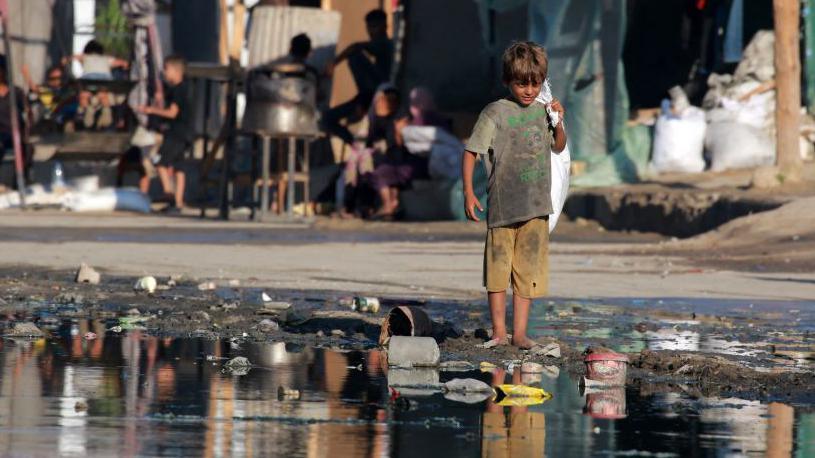
- Published
The waters on parts of Gaza’s Mediterranean coastline have started turning brown as health experts warn of the spread of open sewage and diseases across the territory.
Satellite images, analysed by BBC Arabic, show what appears to be a large discharge of sewage spill off the coast of Deir al-Balah.
A local official told BBC Arabic displaced people in nearby camps are sending their sewage straight to sea.
“It is because of the increase in the number of displaced people and many are connecting their own pipes to the rainwater drainage system,” said Abu Yazan Ismael Sarsour, head of the Deir al-Balah emergency committee.
Wim Zwijnenburg, an environmental expert from the Pax for Peace organisation, confirmed that wastewater appeared to be heading into the sea from nearby crowded camps, after examining the satellite pictures.
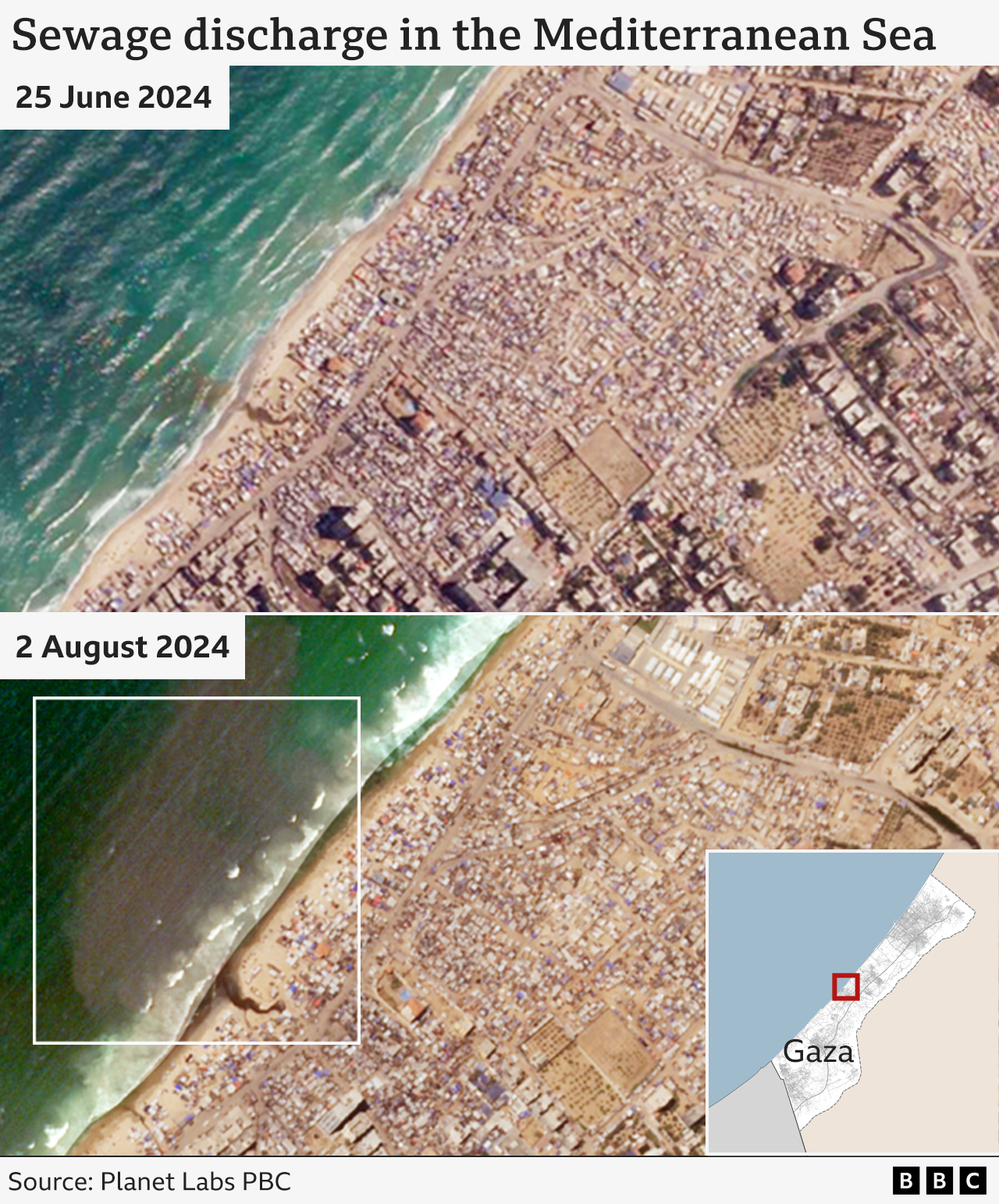
The sewage discharge in the images, captured on 2 August, covered an area of over 2 sq km (0.8 sq miles). Satellite images show the discharge first started appearing in June and that it grew steadily over the next two months.
It is not clear if the coastal pollution is still growing as more recent satellite image are not available.
Intensive Israeli bombardment has led to the collapse of Gaza’s waste water management infrastructure, a UN environmental report concluded in June.
The Israeli defence ministry body overseeing policy for the Palestinian territories, Cogat, told BBC Arabic a dedicated humanitarian taskforce had taken action to improve the sewage system in Gaza.
In recent months, Cogat co-ordinated the restoration of water wells and desalination facilities, as well as the extension of water pipes in Gaza, according to its statement.
The BBC is not able to independently verify specific improvements to Gaza’s sewage infrastructure. Israel, alongside Egypt, does not allow independent journalists into Gaza except on controlled and brief visits with the Israeli military.
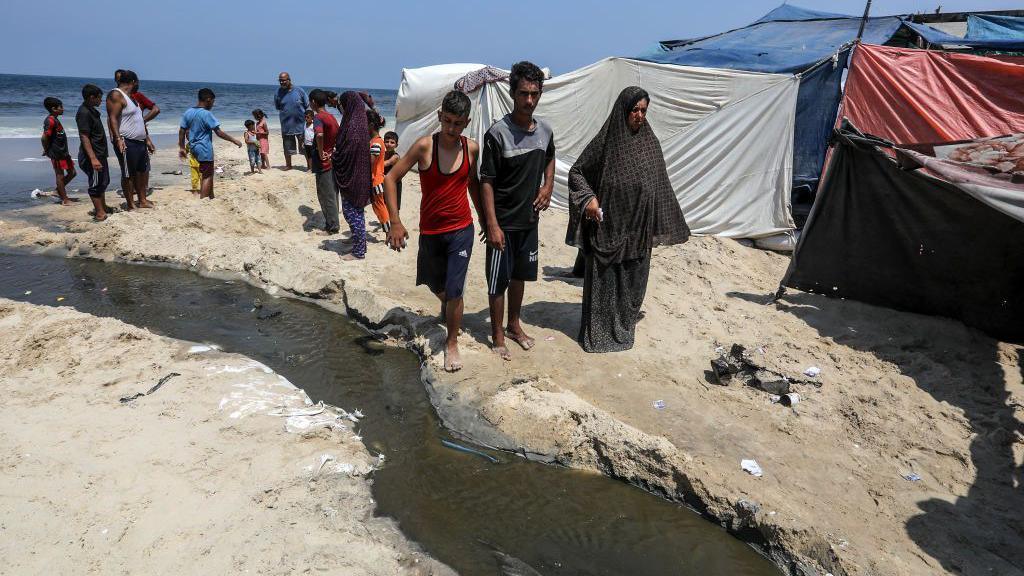
Displaced Palestinians have been forced to set up tents on beaches, where sewage runs into the sea
Health experts, though, are sounding the alarm about the spread of waterborne diseases, after a 10-month-old baby was partially paralysed after contracting polio - the first registered case in Gaza for 25 years.
UN and World Health Organization (WHO) officials also called for two one-week ceasefires so they can vaccinate 600,000 children in Gaza.
But observers say the delivery of vaccines would probably hit the same barriers affecting the flow of other humanitarian aid, making distribution slow and extremely difficult. The destruction of Gaza's health care system will also make any vaccination programme an enormous challenge.
In a response to BBC Arabic, Cogat insisted there were no restrictions on medical aid.
In a later social media statement, Cogat said “an additional 60,000 polio vaccines will be delivered to vaccinate over one million children” in the coming weeks.
The charity Oxfam told BBC Arabic a quarter of Gaza's population had already become ill because of waterborne diseases.
“We are seeing a catastrophic health crisis unfolding in front of our eyes," said Lama Abdul Samad, a water and sanitation expert at Oxfam.
“Polio is a waterborne disease and it is directly linked to the sanitation situation.”
“The sanitation infrastructure has been damaged severely to the point that it is flooding the streets and the neighbourhoods, and people are basically living adjacent to puddles of sewage," she added.
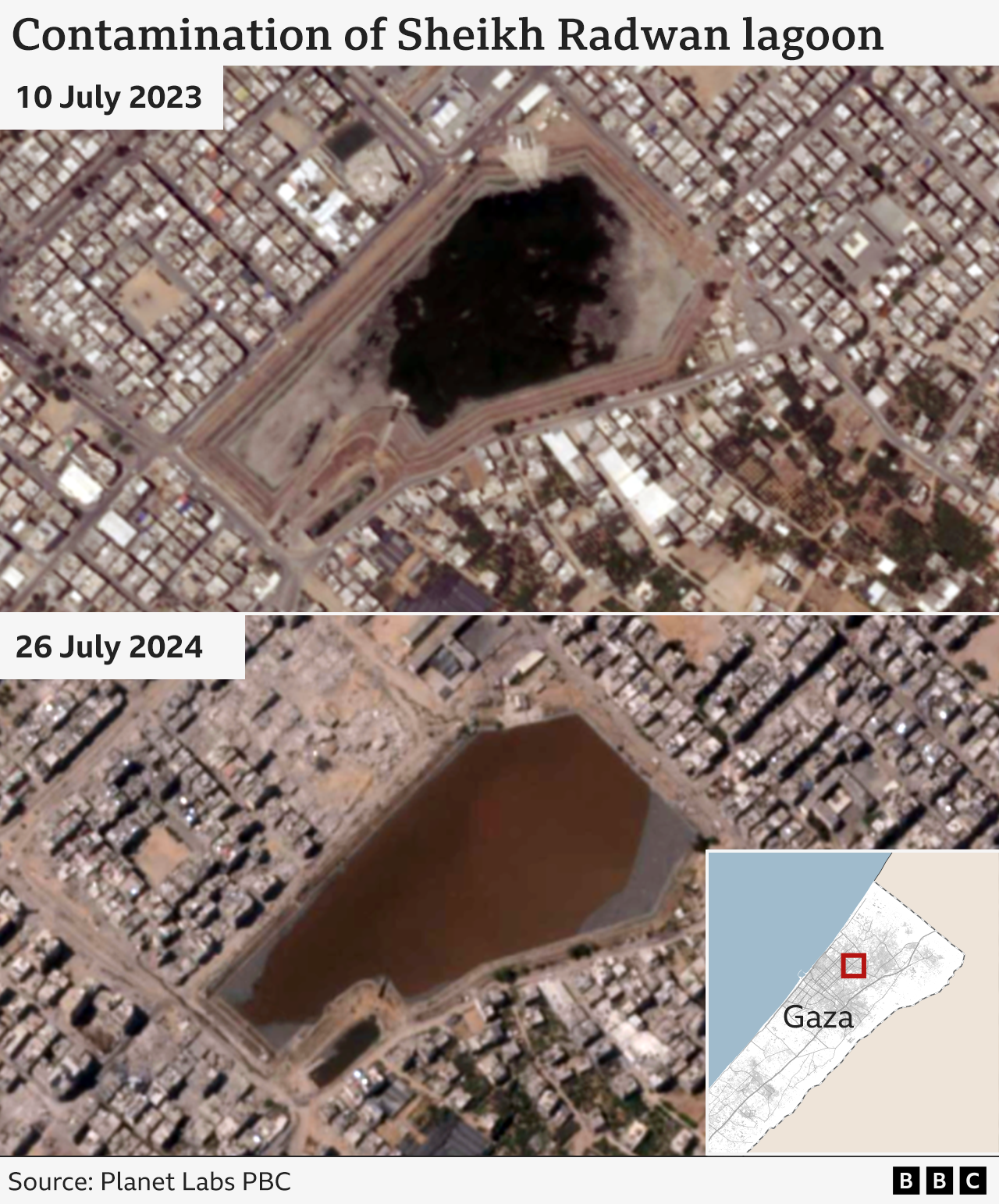
New photos and satellite images analysed by BBC Arabic illustrate how the problem of untreated sewage in Gaza has been getting steadily worse.
The Sheikh Radwan Lagoon in northern Gaza, which was once a source of clean rainwater, appears to be overflowing with dirty water.
The lagoon has clearly been contaminated by raw sewage, Ms Abdul Samad said after assessing the pictures.
Several Palestinians living nearby have complained to BBC Arabic’s Gaza Lifeline emergency radio service of the overflowing waste water, stench and rodents coming out of the lagoon.
“Raw sewage is running into our property because of the overflowing Sheikh Radwan Lagoon,” Ibrahim Ramzi said.
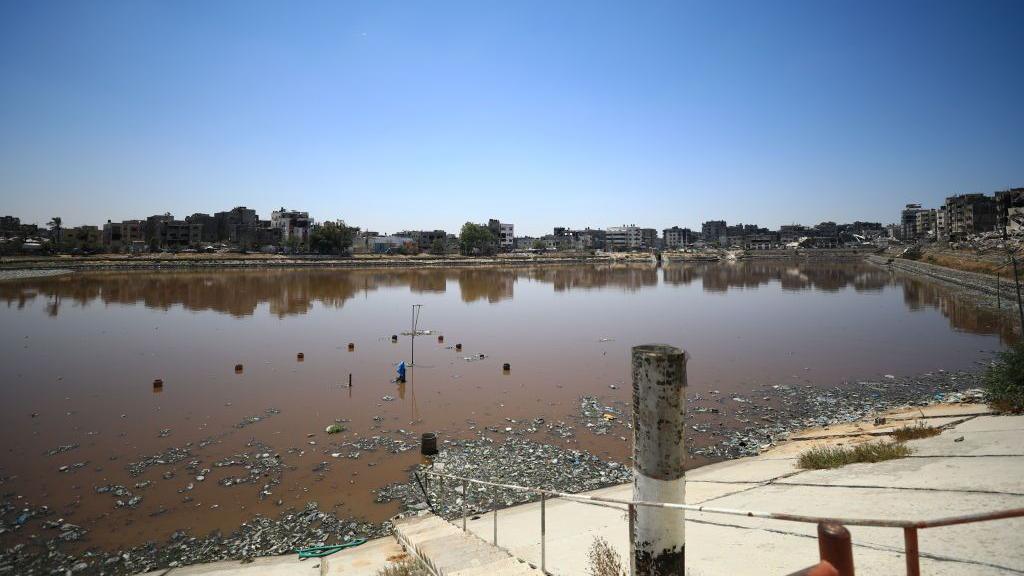
The Sheikh Radwan lagoon was once a source of clean rainwater
Meanwhile, Ghada al-Haddad, an aid worker in central Gaza, sent BBC Arabic a video from a makeshift camp where sewage had built up into a pond next to displaced people. She described the smell as "overpowering" and "unendurable”.
Polio is just one part the heath crisis facing Gaza.
Earlier this month, the UN agency for Palestinian refugees, Unrwa, reported 40,000 cases of Hepatitis A – which can also be transmitted through ingestion of contaminated water - in Gaza since the start of the war compared to only 85 in the same period beforehand.
Public health experts are also warning of a potential cholera epidemic.
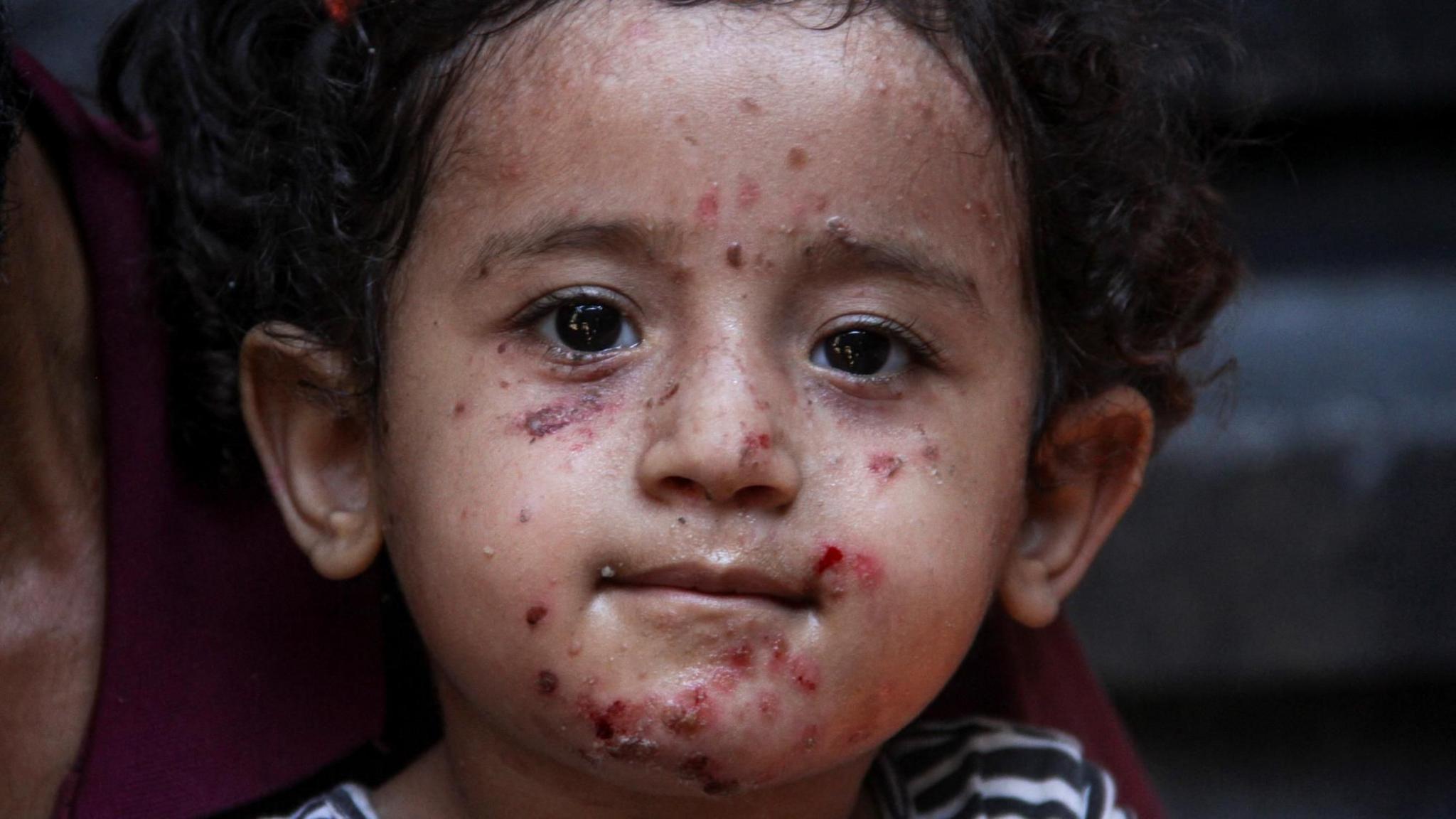
The heat and water crisis has led to an outbreak of skin infections, particularly among children
Aid agencies say doctors in Gaza are also struggling to treat a huge caseload of dysentery, pneumonia, and severe skin diseases because of the collapse of the health sector.
“The reason behind the spread of these bacterial diseases is the complete lack of a sanitation system,” paediatric consultant Dr Ahmed al-Farra explained.
He said the problems included the “mixing of clean ground water and sewage, the severe overpopulation, the extreme heat, the lack of ventilation, the overpopulated tents, [and] the oversharing of toilets”.
The UN estimates the vast majority of Gaza’s 2.3 million people have been internally displaced since last autumn.
Many people are living in shelters with just one toilet for 600 people, a World Health Organization official told reporters in July.
On 7 October, Hamas launched unprecedented assault on Israel, in which about 1,200 people were killed and 251 others were taken back to Gaza as hostages.
Since the attack, the Israeli military operation in Gaza has killed more than 40,200 Palestinians, according to the Hamas-run health ministry.